|
|
|
Sort Order |
|
|
|
Items / Page
|
|
|
|
|
|
|
| Srl | Item |
| 1 |
ID:
165664
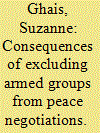

|
|
|
|
|
| Summary/Abstract |
This article examines the relationship between inclusion/exclusion of armed groups and the achievement of durable peace, using process tracing in two case studies: the peace process between the government of Chad and the rebel group Movement for Democracy and Justice in Chad, and the one between the government of the Philippines and the Moro National Liberation Front. The cases support theoretical arguments that excluded armed actors are more likely to renew armed confrontation after the peace accord. The study further elaborates the causal link: included armed rebels tend to negotiate for private benefits such as government posts and amnesty but also moderate their stances and emerge committed to the agreement; excluded armed actors lack any such commitment and still have unresolved grievances. They are thus more likely to renew armed action against the government.
|
|
|
|
|
|
|
|
|
|
|
|
|
|
|
|
| 2 |
ID:
165668
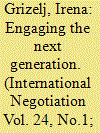

|
|
|
|
|
| Summary/Abstract |
Literature examining the participation of youth during peace processes is limited. Previous work has often focused on youth as “peacebuilders” and agents of change or threats to peace in the post-accord period, with little emphasis on how young people participate during the negotiation phase. This article seeks to fill this gap by assessing youth inclusion and participation in Myanmar’s ongoing peace negotiations. The study finds that, while youth have not had formal inclusion avenues in the peace negotiations, there are cohorts of young people who perceive themselves to be legitimate stakeholders in the peace process, who have attempted to gain access to decision-making in the peace negotiations, and have played active roles in supporting the process. It is argued that recognizing youth as key stakeholders in the peace accord will play a vital role in building sustainable peace within Myanmar’s nascent democracy.
|
|
|
|
|
|
|
|
|
|
|
|
|
|
|
|
| 3 |
ID:
165665


|
|
|
|
|
| Summary/Abstract |
This article examines the inclusion of business sector actors in peace and political transition negotiations. Looking across twenty-two cases, this study examines who has been included as business sector representatives in these negotiations and through which inclusion modalities. The study finds that business sector actors were included primarily through consultation modalities in officially mandated meetings running parallel to negotiations, informal consultations, or as part of public consultations. Second most common is direct representation of business sector actors at the negotiation table. Less common is business sector inclusion in high-level track one-and-a-half workshops and inclusive commissions. The article then focuses on the impact of business actors on negotiations. Four cases of business inclusion are discussed in detail – Somalia, Kenya, Guatemala and El Salvador – comparing and contrasting supportive and obstructive examples.
|
|
|
|
|
|
|
|
|
|
|
|
|
|
|
|
| 4 |
ID:
165663
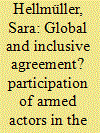

|
|
|
|
|
| Summary/Abstract |
This article provides an analytical framework to understand how participation of armed actors in peace negotiations influences local violence. It argues that the link between violence and exclusion or inclusion of armed actors is often indirect and depends on armed actors’ underlying motivations to be included and their corresponding strategies. Based on an analysis of the Congolese peace process from 1999 to 2003, the article assesses how the mandate of the peace process influenced armed groups’ motivations to be included. It then analyzes the strategies that armed actors used to be included and examines their impact on local violence. Thereby, it allows for a more nuanced understanding of how participation of armed actors in a mediation process influences prospects for peace.
|
|
|
|
|
|
|
|
|
|
|
|
|
|
|
|
| 5 |
ID:
165661
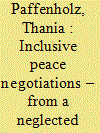

|
|
|
|
|
| Summary/Abstract |
The objective of this special issue on inclusive peace negotiations is to advance the debate on negotiations. It sheds light on included and excluded actors, in particular political parties, civil society, business, youth and religious actors, and those armed actors that are either excluded or included. This special issue is particularly interesting as all articles combine a conceptual introduction of the role of the discussed actor in question in peace negotiations with a case study approach. This method enriches conceptual discussion and debates on the role of the various actors through analyses of several peace negotiations, including among others, DRC, Kenya, Liberia, Sierra Leone, Somalia, Guatemala, El Salvador, Bosnia & Herzegovina, Macedonia, Great Britain and Northern Ireland, and Myanmar.
|
|
|
|
|
|
|
|
|
|
|
|
|
|
|
|
| 6 |
ID:
165666
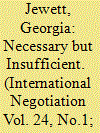

|
|
|
|
|
| Summary/Abstract |
Civil conflicts are more intractable and complex than ever before. In these conflicts, civilians are increasingly targeted and weaponized. Yet, because civilians are disproportionately affected by the ensuing violence and instability, they also have a larger role to play in the peacemaking process. This stems from the fact that local civil society organizations (CSO) assume new responsibilities vis-a-vis their communities as the state disintegrates. They often became the coordinators and providers of basic security and services. Unsurprisingly, CSO leaders often emerge as the only credible and authoritative actors in this complex environment, trusted by both the disputing parties and the affected communities. This article argues that CSOs are necessary to any international mediation process; however, they must be leveraged in conjunction with conventional third party mediator resources (that is, financial, technical and military assistance) to maximize the potential of an enduring peace deal.
|
|
|
|
|
|
|
|
|
|
|
|
|
|
|
|
| 7 |
ID:
165662
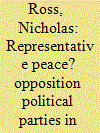

|
|
|
|
|
| Summary/Abstract |
This article presents four case studies in which peace was negotiated between governments and political opposition parties, and in which major armed groups involved in the conflict were excluded from some or all of the negotiations. The inclusion of opposition political parties and exclusion of some armed actors in these cases derived from the desire of mediators and some of the parties to foreground political concerns (at the expense of military considerations). Opposition political parties were able to play a role in bringing armed groups into peace settlements under some conditions, although strong international pressure and support helped to create the preconditions for this role. This evidence suggests a challenge to arguments that major armed groups must be included in peace negotiations if they are to abide by the resulting peace settlement.
|
|
|
|
|
|
|
|
|
|
|
|
|
|
|
|
| 8 |
ID:
165667


|
|
|
|
|
| Summary/Abstract |
This article uses a comparative approach to analyze the strengths and limitations of the inclusion of religious actors in peace and transition processes. It compares the theoretical frameworks of Bercovitch and Kadayifci-Orellana, and Brewer, demonstrating how the first helps us understand the strengths of religious actors, while the second sheds more light on their limitations. An analysis of the involvement of religious actors in the peace processes in Northern Ireland and Bosnia and Herzegovina supports the argument that religious actors are more likely to contribute to peace when they are excluded from Track One negotiations and are active in other modalities of participation: in wider social peace processes at national or grass-roots levels. Religious actors can contribute to peace processes especially if they choose to exclude themselves from Track One negotiations in order to avoid the pitfalls of becoming too closely associated with political power.
|
|
|
|
|
|
|
|
|
|
|
|
|
|
|
|
|
|
|
|
|